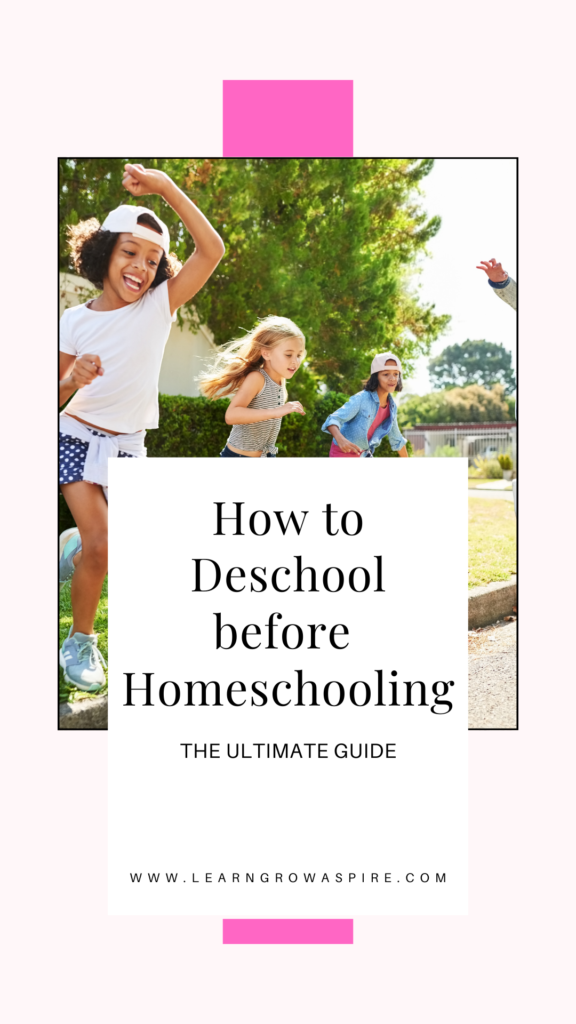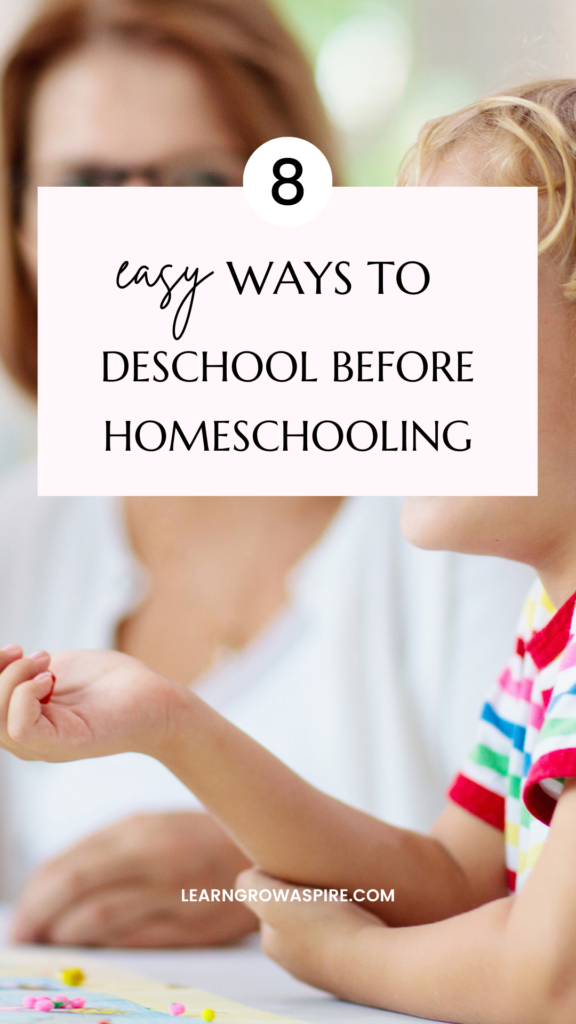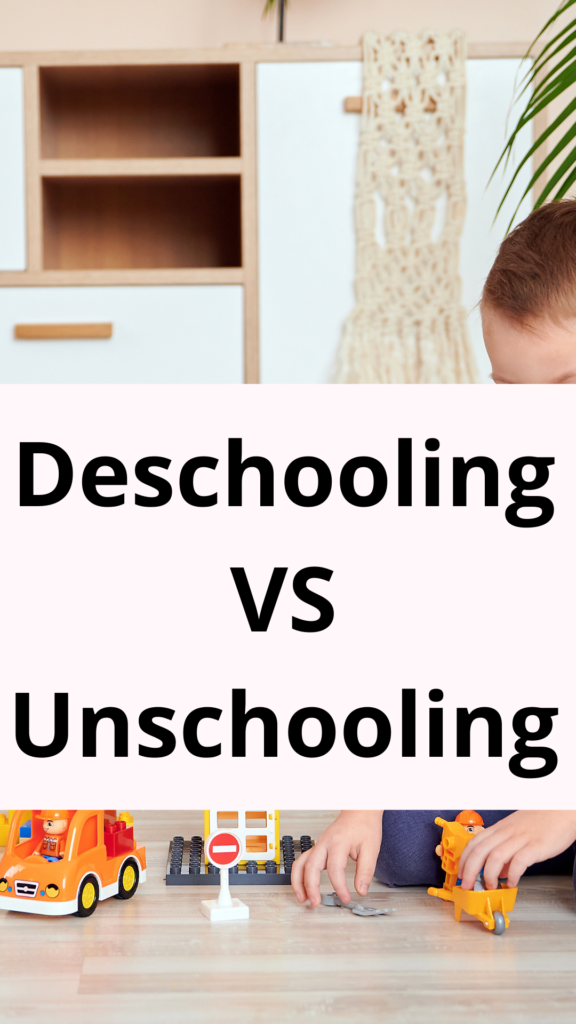You’ve finally mustered up the courage to homeschool your kid/kids – Bravo! But wait, the homeschooling communities on every Facebook group suggested that you should probably consider deschooling your kids. And now you are overwhelmed with all this talk about deschooling before homeschooling. Don’t worry, my friend, I’ve put together this blog post on how to deschool before homeschooling for overwhelmed parents like yourself.

You see, everything that I’m about to share with you on deschooling before homeschooling, I wished I had known when I first started homeschooling. And I know, that if I wasn’t able to find the answers, so were other first-time homeschooling parents. Hence now, that I’ve learned so much from my own homeschooling journey I wanted to pay it forward with this blog post.
So, without further ado – what does it mean to deschool before homeschooling?
What is Deschooling?
Very simply put deschooling is that period when your child has exited the traditional school system and is transitioning into homeschooling. It’s a temporary break that will allow both you and your child to break free from the conventional educational system and shift into learning at home. Getting involved in experiences and activities that spark curiosity and joy.
So, instead of the boring textbooks, and curriculum your child will be doing more exploring or activities that are hands-on.
How long should Deschooling last for?

The main reason for deschooling is to break free from the traditional school system. To unlearn what we (both parents and kids) have been familiar with and retrain ourselves to what our new reality is going to be – which is learning from home.
So, the brutal truth here is there’s no set amount of time for deschooling. It really depends on your unique circumstances.
Such as – how long your child has been in the public school system. Your reasons for choosing to homeschool. Maybe your child was not receiving the attention needed at school. Bullying or relocation (like us). Maybe your child asked to be homeschooled.
Some suggest deschooling should last for a few weeks, a few months, some even said up to a year.
In my opinion, it really depends on what you think is best for you and your family.
As the parent you get to choose your comfort level and what you believe to be right for your child.
Why Should You Deschool Your Kids?
Mindset shift!
In my opinion, that’s the biggest reason for deschooling before homeschooling! You want your “round” child to get out of the “square box” that the traditional school system has placed them in and begin cultivating a love for learning. One that goes beyond textbooks and assignments and exams.
Build a solid foundation for your kid
When you dedicate the time to deschool before homeschooling you will lay a solid foundation for a thriving and successful homeschool experience. Fostering a love for learning and a curiosity-driven atmosphere at home.
Help your child adjust
This timeframe gives your child an excellent opportunity to break free from the rigid schedules and standardized expectations of traditional schooling, allowing for a more organic and personalized approach to education.
Helps you to better understand your kiddo
Deschooling will help you gauge how best your child learns, things that are of no interest to your child, and what lights your kiddo’s heart on fire. Areas that need more emphasis and how you can continue raising a strong, confident, social-emotional child.
Some other reasons why you should deschool your kids are:
- If your child was bullied or treated unfairly at school they may need some time to heal from the trauma and shame they’ve felt while in school.
- To help them cope with the loss of friendships. Fear of missing out on fun activities that school kids get to experience such as graduations, field trips, time away from home, etc., As well as coping with the worries that others may refer to them as “unsocialized homeschoolers.”
Ways You Can Deschool Your Kids

Embrace Unstructured Playtime:
Have days where absolutely nothing is scheduled! Give your kids the ability to engage in unstructured play, where they can explore their interests and creativity without having to meet any expectations from you. This will allow them to rediscover the joy of learning and doing the things that spark joy in them.
Explore Interest-Based Learning:
Have conversations with your child as to what they are eager to learn or have an interest in. Then integrate them into your daily activities. Whether it’s arts and crafts, science experiments, nature exploration, or even playing video games. (Our kids do learn quite a lot from playing age-appropriate video games.)
Take Educational Field Trips:
Spend some time exploring outdoors by going for walks, hikes, or bird watching. Visit parks and local landmarks that will provide learning opportunities outside of the classroom.
Science centers are always a hit for us. Have a day when you drop in at your local library. Create a grocery list and go shopping together.
Learning should never be confined to four walls. Have fun and make everything a learning experience.
Foster A Love For Reading:
Set some time daily for reading. Create a cozy reading nook at home where your child can go and spend some time every day reading.
Visit your local library or bookstore and allow your child to choose books that are based on their interests. There was a period of time when all my son wanted to read were books that contained rocks and gems. To this day he is still obsessed with National Geographic books. At least they are not always about rocks this time around! 🙂
On days when your child doesn’t want to read that’s okay. Let them watch a read-aloud on YouTube. Our favorite is KidsTimeStoryTime. I bet your kids will love this as well!
Create a Flexible Routine:
There’s no need for a rigid schedule when deschooling but it’s always nice to have some sort of routine. This will help create a sense of security.
Routines also allow for a balance between free time and planned activities, which will come in handy during your homeschooling journey.
Cultivate Life Skills:
A big part of our homeschooling journey is focusing on life skills (something that’s not often taught in the school system). If you have been thinking about incorporating life skills into your homeschooling lesson plan now is the perfect time to start.
You can do so, by inviting your kids to cook with you in the kitchen or to help with laundry. If you have an outdoor garden get the kids involved. Maybe you can consider including them when you are working on your budget and meal planning for the week ahead.
Including your kids in these activities will contribute to learning responsibilities as well as provide real-world knowledge.
You can also check out ShareSkills. They have many valuable videos and training that can help not only your child but you as well when it comes to learning new skills. We’ve personally used them for learning crafts.
Record Keeping:
It’s a good idea to keep a journal of your child’s deschooling journey. You can do this by taking photos throughout your deschooling process, notes, drawings, activities your child worked on, etc.
Maybe (depending on your child’s age) you can have them create their own scrapbook.
Having a journal or scrapbook of your deschooling journey will identifty how fun and more in-depth learning can be outside the traditional school system.
Open Communication:
Deschooling is a time when you get to bond with your child and gain a better understanding of them. During this time foster a supportive and empowering environment so that your child builds trust with you. And feel comfortable sharing their feelings and thoughts with you.
Deschooling VS Unschooling

As someone who had not heard the terms deschooling and unschooling until I began my homeschooling journey. I thought it would be handy to add this part in the blog where I differentiate the two.
Deschooling and homeschooling are not the same. It’s two different approaches to education.
As I mentioned earlier – deschooling is a transitional period that allows children to break free from the traditional mindset of structured classroom learning before beginning their homeschooling journey.
During this time, families tend to engage in unstructured play, tapping into the things that are of interest to them while rediscovering the joy of learning. With the hope of building a positive and solid foundation for a unique and successful homeschooling experience.
On the other hand, unschooling represents a more radical departure from traditional education. With the belief that learning is a natural process that occurs organically through life experiences.
Unschooling emphasizes self-directed learning. and is an ongoing philosophy that encourages children to pursue their interests at their own pace without a structured curriculum.
Unschooling places a high value on the autonomy of the child, allowing them to take the lead in their educational journey.
Understanding these distinctions will help you make informed decisions about the approach that aligns best with their homeschooling goals and values.
In conclusion
Some of the links in this post may be affiliate links. I’m also an Amazon Affiliate and will occasionally link to some of my favorite Amazon products. I will receive a small percentage back if you purchase through my link. You won’t be charged a penny more if you shop through my links. That said, I do NOT recommend anything I do not use and love! Thank you for helping support my blog!

